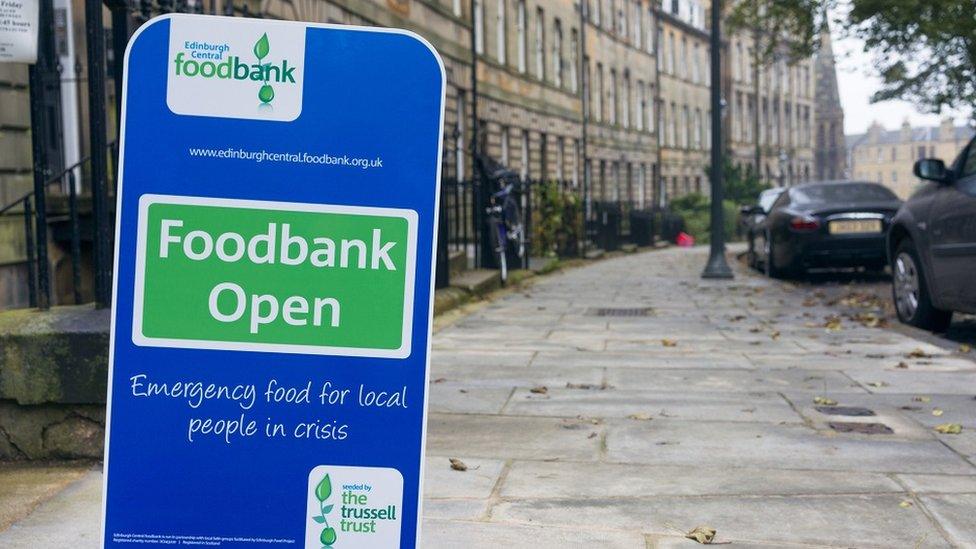Food bank parcel numbers in Scotland hit record high
- Published

The number of emergency parcels handed out by food banks in Scotland jumped by nearly a quarter over the last year, new figures indicate.
The Trussell Trust said its food banks provided more than 210,000 packages to people in crisis in 2018-19.
It was a 23% jump from the previous year and the charity described the situation as "unacceptable".
The UK government said it would be wrong to blame benefit changes or delays for the figures.
But the Trussell Trust said the cost of living and delays to benefits were cited by clients as the main reason for them visiting the food banks.
Its Scotland operations manager Laura Ferguson said 42% of food bank referrals made due to a delay in benefits were linked to Universal Credit.
The Trussell Trust handed out 210,605 food bank parcels last year, compared to 71,428 in 2013-14
She said: "What we are seeing year-upon-year is more and more people struggling to eat because they simply cannot afford food. A 200% increase in just five years is not right.
"Ultimately, it's unacceptable that anyone should have to use a food bank in the first place. No charity can replace the dignity of having enough money to buy food.
"Our benefits system is supposed to protect us all from being swept into poverty.
"Universal Credit should be part of the solution but currently the five-week wait is leaving many without enough money to cover the basics.
"As a priority, we're urging the government to end the wait for Universal Credit to ease the pressure on thousands of households."
'Beyond wake up calls'
Of the 210,605 three-day emergency food supplies given to people in crisis by the trust last year, nearly 70,000 went to children.
The total for 2018-19 was a record high.
The charity said the main reasons for people needing emergency food were benefits consistently not covering the cost of living (35%), and delays (19%) or changes to benefits (17%) being paid.
There are 84 independent food banks operating in 18 Scottish local authorities, with The Trussell Trust operating 52 of them
Campbell Robb, chief executive of the Joseph Rowntree Foundation charity, said: "It is just wrong that in our society a growing number of people, including children, are going hungry because of our consistent failure to get to grips with poverty.
"When the use of food banks reaches a record high we are beyond the language of warning signs and wake up calls. Unless we take bold action to solve poverty we risk undermining what we stand for as a country."
A Department of Work and Pensions spokeswoman said: "It is not true to say that people need to wait five weeks for their first payment. Universal Credit is available to claimants on day one.
"It cannot be claimed that Universal Credit is driving the overall use of food banks or that benefit changes and delays are driving growth.
"The Trust's own analysis shows a substantial fall in the share of parcels being issued due to benefit payment delays.
"The best route out of poverty is to help people into sustainable employment which, with record employment, we are doing."